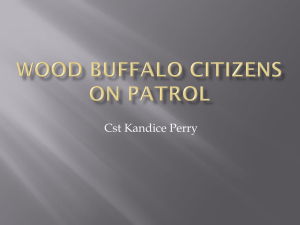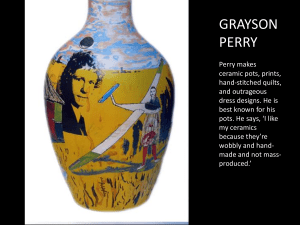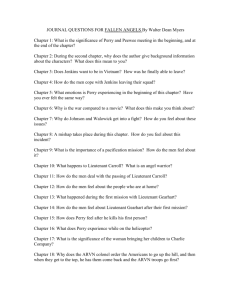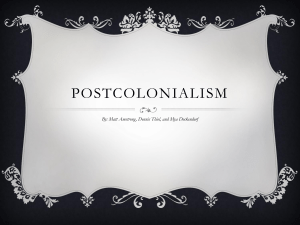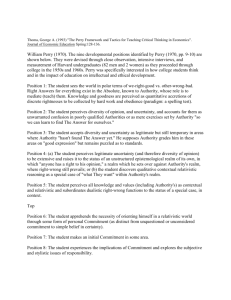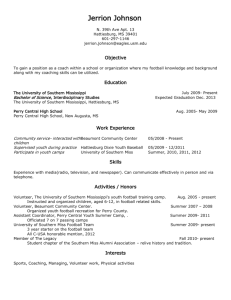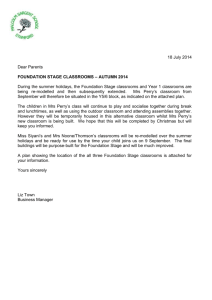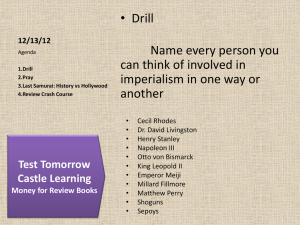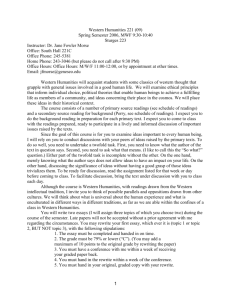Are you seeing me? - Scholastic Australia
advertisement
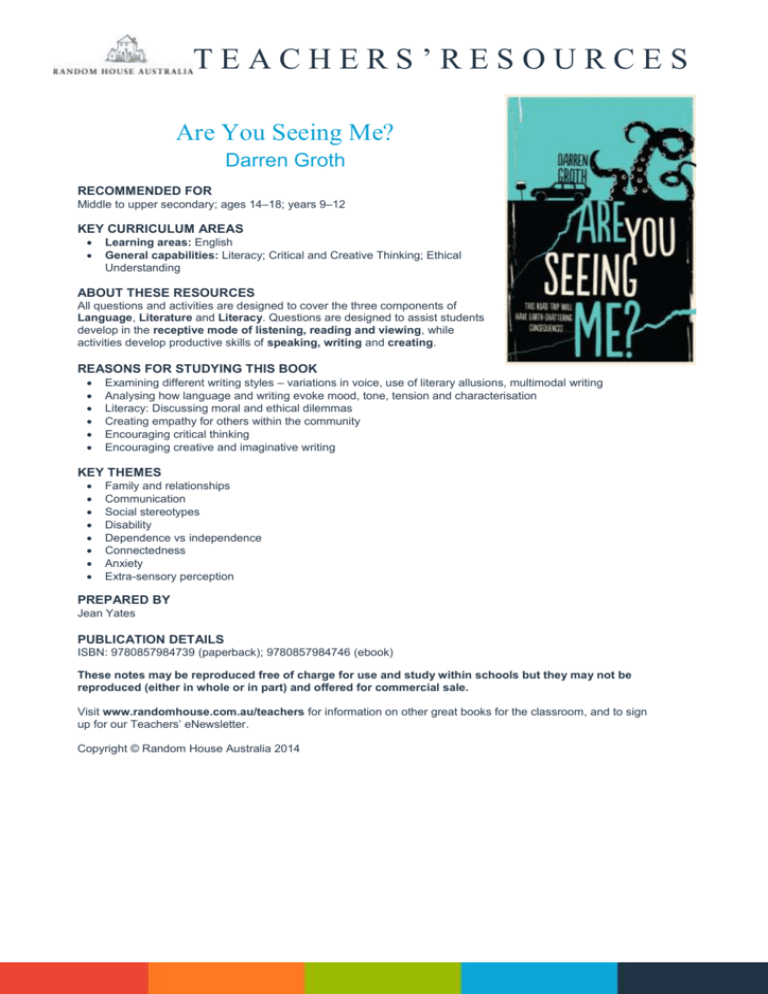
TEACHERS’RESOURCES Are You Seeing Me? Darren Groth RECOMMENDED FOR Middle to upper secondary; ages 14–18; years 9–12 KEY CURRICULUM AREAS Learning areas: English General capabilities: Literacy; Critical and Creative Thinking; Ethical Understanding ABOUT THESE RESOURCES All questions and activities are designed to cover the three components of Language, Literature and Literacy. Questions are designed to assist students develop in the receptive mode of listening, reading and viewing, while activities develop productive skills of speaking, writing and creating. REASONS FOR STUDYING THIS BOOK Examining different writing styles – variations in voice, use of literary allusions, multimodal writing Analysing how language and writing evoke mood, tone, tension and characterisation Literacy: Discussing moral and ethical dilemmas Creating empathy for others within the community Encouraging critical thinking Encouraging creative and imaginative writing KEY THEMES Family and relationships Communication Social stereotypes Disability Dependence vs independence Connectedness Anxiety Extra-sensory perception PREPARED BY Jean Yates PUBLICATION DETAILS ISBN: 9780857984739 (paperback); 9780857984746 (ebook) These notes may be reproduced free of charge for use and study within schools but they may not be reproduced (either in whole or in part) and offered for commercial sale. Visit www.randomhouse.com.au/teachers for information on other great books for the classroom, and to sign up for our Teachers’ eNewsletter. Copyright © Random House Australia 2014 Are You Seeing Me? Darren Groth PLOT SUMMARY Justine and Perry Richter are twins, separated by just three minutes and a twist of fate. Abandoned by their mother as children, and having lost their father to cancer almost two years ago on the eve of their eighteenth birthdays, Justine is left as the sole carer for her disabled brother. At a time when most adolescents struggle for independence and to form their own identities, the twins are left to map out their own futures. Perry is about to leave home to start his own life at the Fair Go assisted-living community. But before he does so, Justine decides to take him on a road trip to Vancouver, a journey that will give them one final shared experience and a lifetime of memories. For Justine, the trip is a chance to grieve for her father and to try to put the past behind them. Despite years of caring for her brother and helping him to cope with an unforgiving society, she struggles with the idea of her upcoming independence. To make matters worse, her relationship with her boyfriend, Marc, is also under pressure. For Perry, despite the fear and sensory overload of different environments and new experiences, this trip is a dream come true, a chance to indulge his love for earthquakes and mythical creatures. It will also provide the perfect opportunity to set his sister free and prove to her that he is more than capable of managing on his own. What Justine hasn’t yet told Perry is that at the end of the journey waits ‘The Appointment’, a meeting that could have earth-shattering consequences for them both. ‘A funny and beautiful story about love, life and other disasters, told with the help of Robinson Crusoe and Jackie Chan. I think what we’re “seeing” here is a writer at the top of his game. Just wonderful.’ – CBCA award-winning author Michael Gerard Bauer ‘Are You Seeing Me? is written powerfully with both the heart and the head, and neither gives an inch. It’s funny, moving and hugely insightful. Darren Groth puts the reader into the heads of Perry and Justine in a way that feels so true and so revealing that I think I’ve come away with a greater capacity for empathy. I didn’t know a book could do that. We all need to spend some time inside this story.’ – CBCA award-winning author Nick Earls READERS’ RESPONSES The value of reading Are You Seeing Me? and studying it in the classroom is highlighted by some of the wonderful reviews the book has received from readers. The heartfelt responses to the book from young adult reviewers in the Random House Book Buddies group demonstrate how strongly teen readers can connect to, and engage with, the characters and themes of this book: ‘I loved that it allowed us to see the lives of people who don't always get a lot of portrayal in books and in everyday life: the people who sacrifice themselves for others and those who have things sacrificed for them. When I finished this book, I closed it, and then I cried, because it was so beautiful, so ugly and sweet and harsh and lovely. This book . . . was a slow, beautiful amalgamation of emotion and loss and I loved it.’ – Anneka, age 17 ‘The story is amazing, it truly captures the mind of someone living with a mental disability and getting to hear the story through both protagonist's eyes and minds really gives you an understanding into how both characters react and behave to different situations. I couldn't put the book down, it certainly encapsulated my full attention right up until the nail-biting finish.’ – Chloe, age 18 ‘Every sentence seemed to be thought out very carefully, which made me read it very carefully. I felt strong emotions for characters that changed within a few pages . . . The story really made me think about a lot of different matters to do with families, travelling, disabilities and earthquakes. I found it very inspiring. Are You Seeing Me? has made ME see things in a whole new light.’ – Gemma, age 15 ABOUT THE AUTHOR Originally from Brisbane, Australia, Darren Groth now lives in Vancouver, Canada, with his Canadian wife and twelve-year-old twins. His books have been published on both sides of the Pacific and include Kindling and Most Valuable Potential, which was shortlisted for the Queensland Premier’s Literary Awards – Young Adult Book Award. Darren has appeared at numerous literary events including the Byron Bay Writers’ Festival and Brisbane Writers’ Festival. He has been a guest speaker, workshop and masterclass facilitator There’s so much more at randomhouse.com.au/teachers 2 Are You Seeing Me? Darren Groth and writer-in-residence for literary organisations, writing groups, schools and libraries, and has written articles for publications including The Courier-Mail, Writing Queensland and Mamamia. Darren, a former special education teacher, is passionate about promoting awareness and understanding of autism spectrum disorder (ASD), and he is the proud father of an ASD son. www.darrengroth.com AUTHOR’S INSPIRATION Darren Groth says: Like Dan Richter in Are You Seeing Me?, I am Dad to a set of twins: one girl, one boy. My daughter is ‘neurotypical’, which is how people in the Autism Spectrum Disorder (ASD) community sometimes refer to regular, everyday kids who do not have autism. She is amazing. She plays trumpet, creates short animated films and adores The Hunger Games. My son, who is three minutes younger than my daughter, is diagnosed with autism. He is amazing, too. He is awesome at Minecraft, swims like a champ and enjoys Pixar films. They will officially be teenagers in 2014. Are You Seeing Me? is a gift to my daughter. She was due a book – my previous novel, Kindling, was a gift to my son. (By the way, all of my books are gifts for my beautiful wife.) When I first started considering what to write, I kept coming back to a message I held dear for my daughter: ‘You should never feel like you must be your brother's keeper. Love him, as he loves you, but live your own life to the full.’ I imagined another girl hearing this message from her dad; a girl who, like my daughter, knew the joys and challenges of sharing childhood with a disabled twin brother. A girl who, unlike my daughter, was nearing the end of adolescence rather than just the beginning. A girl who had grown up without a mother and had lost her father on the cusp of turning eighteen. A girl who, through the unfairness of Fate, found herself the sole carer of her special, same-age sibling. A girl I chose to call Justine. I imagined a boy, too. Perry. Pez. I knew from the beginning he would share the story equally with his sister. Some things about him I could recognise in my own son – affection, sense of humour, his pain at the distress of his sister. Other things would belong solely to Perry – those ‘extra-sensory’ abilities, his capacity to converse, his constant search for social meaning, his fascination with earthquakes and sea monsters and Jackie Chan. He would have a big heart and a strong voice. He would be different, but the same. Above all else, he would understand: we cannot live in a world of one. Our dependence upon each other – for me, that's the essential theme of Are You Seeing Me?. Dependence is not defined by age or intelligence or physical prowess or a diagnosis. It is determined by simple existence. If we walk on the Earth – a planet with its fair share of instability and difficulty and struggle – we don't walk alone. Every one of us needs the people around us, even those we might never meet. All the characters in the book, from the main protagonists to the extras, share that common reliance on the lives that surround them. Even Ogopogo needs the hawk circling high above his head in order to appreciate the sky. To finish up, I wanted to share some trivia connected to Are You Seeing Me? you might find interesting (especially once you’ve read the book): The story went through three working titles before arriving at Are You Seeing Me?: The Mantle, Finding Fault and Master Disaster. The day after I sent the complete edited manuscript to my publisher, an earthquake was felt in Vancouver. Thankfully, nothing like Perry's prediction. But still freaky, hey? My wife’s aunt lives in a house that overlooks Okanagan Lake and the purported home of Ogopogo, Squally Point. I’ve visited twice and watched the lake, hoping to see evidence of the mythical sea monster. No luck so far. I think Ogopogo trusts Perry a lot more than his author. Mt Baker – the peak Justine sees on Highway 99 – is a beautiful sight on a clear Vancouver day. The mountain is not in Canada – it is in the US state of Washington, some 230 kilometres away. The earthquake-proof Qube building described in the novel must be seen to be believed. If you can't view it in person, I recommend checking it out at the blog We F***ing Love British Columbia! (http://wflbc.com) My favourite Jackie Chan movie is Drunken Master II. There’s so much more at randomhouse.com.au/teachers 3 Are You Seeing Me? Darren Groth LANGUAGE AND WRITING STYLE Dual narrators Darren Groth has chosen to tell this story from the perspectives of both Justine and Perry. This not only helps him to further develop their characters, but also makes us think about the ways in which we judge others, especially when their voices are silenced. Questions What is the impact of telling the story through the eyes of two different characters? How would it be different if we only saw things through Justine’s eyes, or solely through Perry’s eyes? Why is it important to give Perry his own voice, especially when he has trouble expressing his thoughts out loud? Does your interpretation of each character change when you hear about them from the other character’s voice? Why? What does this suggest about people’s interpretation of the world around them? Creating characters Perry is standing on the far side of the metal detector, feet planted on the red stripe. Beads of sweat dot his forehead. His right leg twitches, keeping pace with some inaudible rhythm. At regular intervals, his lips curl inward then spring open, releasing a loud pop. He’s stuck. He’s been stuck for a while . . . Perry hears none of it. His hands are clasped together on top of his head. A pronounced lean has gripped the left side of his body. The pops have morphed into heavy sighs. The soles of his shoes remain fixed to the red stripe. (p. 1) Questions and activities When you first meet Perry how old do you think he is? What words, phrases or images make you think this? Why do you think Darren Groth chose to introduce Perry in this way? Why is this the opening passage of the novel? Consider and compare the way in which Justine and Perry speak. How does Darren Groth manage to create their characters through his language? In particular, how does he depict Perry through the way the character speaks? How does language help to create the other minor characters such as Clinton Muckler and Jim Graydon? We hear the voices of Dan, Justine and Perry, but we don’t really hear Leonie’s voice. This is referred to as silencing a character. Why might the author have made the decision to silence Leonie? What impact does that have on the way we view her character? What if Leonie could have her own voice? Choose one of the scenes in which she is with Justine and/or Perry. Re-write the scene from her point of view. Descriptive writing A king tide of blood pummels my eardrums. The onlookers are panes of glass. Somewhere, in the distant burbs of my mind, I ask: How did my job description become flinging books at my twin brother to avoid disaster? The throw clears the metal detector, hits the floor and skims a few feet, before coming to rest at the toe of Perry’s right shoe. For a fleeting moment, there is only stillness; the wait to discover if the tall ship of clarity has dropped anchor in the swirling eddies of sensory distress. (p. 7) In the cavernous spaces, Dad’s words buzz like mosquitoes: Don’t bother keeping in touch. (p. 65) The river is lumpy. (p. 85) She’s like a human house of cards, afraid of collapsing with the next breath of air, staring at her clasped hands on the table. (p. 204) What happened at the PNE has taken my core away, leaving only the crust. I am like one of those chalk outlines of a body they draw on the ground. (p. 233) Questions and activities How does Darren Groth add interest to his writing through his descriptions? There’s so much more at randomhouse.com.au/teachers 4 Are You Seeing Me? Darren Groth How do the descriptions differ between the two characters? You’ll find the author uses quite different similes, metaphors and descriptive styles depending on the point of view. What deliberate choices has the author made in these descriptive styles? For instance, consider the way in which Justine uses classic books and analogies, whereas Perry is more straightforward. Why does Justine refer to the reunion with their mother as ‘The Appointment’? What does this suggest about how Justine feels about it? Why does Darren Groth use capital letters for ‘The Appointment’? When do we use capital letters in everyday speech? Find your favourite descriptive passage or phrase in the novel and explain why it appeals to you. Use some of the techniques in the book (simile, metaphor, analogy, etc.) to describe an emotion you have felt. Multimodal writing Darren Groth does not just use prose to tell the story but includes a range of writing styles and genres. These include: Justine’s dreams Perry’s hallucinations / imagined scenarios Dan’s letters to Justine Perry’s (and Justine’s) lists Marc’s phone messages and text messages References to other literary texts. Questions and activities What impact do these multimodal forms have on the novel? Did their inclusion add to or detract from your enjoyment of the novel? How would the novel be different without them? How do these varied writing styles help to add to the messages in the novel? (Is one form of writing superior to the others? Is the book better for this variety? Is society better for variety?) Nicknames and labels Perry calls Justine ‘Just Jeans’ and she calls him ‘Pez’. Their father called Perry ‘Master Disaster’ and Justine his ‘little tree frog’. Questions and activities Why do we use nicknames? How do people get their nicknames? Make a list of the nicknames of people in your class and divide them into categories to reflect how people get their nicknames. Do you allow everyone to call you by your nickname? Who would you allow and not allow to use it? Are there any times at which it would be inappropriate to use a nickname? Note the moments when Perry starts to call his mother ‘Leonie’, and then ‘Mum’ – are these changes significant or symbolic? Why does Justine tell Leonie that she does not have the right to call her Just Jeans? What is the difference between these types of nicknames and the names Perry is given at school and by others in society, such as ‘spaz’ and ‘retard’? What do those derogatory nicknames reveal about the people who use them? How can nicknames help a writer to establish characters and relationships? Writing humour I like the mantle the best out of the four. It’s mainly made up of molten lava, and the crust floats on top of it and is always moving. Isn’t that cool?’ . . . ‘That’s a funny joke saying it’s cool because the temperature can actually rise to five thousand, four hundred degrees Celsius. (p. 12) There’s so much more at randomhouse.com.au/teachers 5 Are You Seeing Me? Darren Groth That’s my last name – Richter. No lie. My father used to say it was my scale and that was a funny joke, too, because it was invented by Charles Richter in nineteen thirty-five, which is fifty-five years before I was born. In fact, it was twenty-eight years before my father was born –’ (p. 13) ‘Justine, if you don’t mind me asking, did you say you were Perry’s sister and carer?’ ‘Yes.’ ‘Do you mean just for your trip?’ ‘No, I’m his sister all the time.’ A badoom-tish follows. I announce that I’m here all week and ask they don’t forget to tip the waitress. Jane blinks three times. ‘Sorry, my jokes aren’t as good as Perry’s. The answer to your question is no, I am the current full-time carer for my brother.’ (pp. 15–16) It could be said that Are You Seeing Me? contains a surprising amount of humour, given the seriousness of the subject matter. Questions and activities What impact does humour have in the writing? Why do people often use humour in the most difficult circumstances? Consider how Perry uses humour. How is it different to the way others might use it? How does this add to his character? Given Perry’s communication difficulties, do you find it surprising that he can use humour, especially puns, in such an effective way? Foreshadowing Foreshadowing occurs when apparently small incidents in a novel give a warning as to a bigger, more significant event that will happen later (such as the car accident in The Great Gatsby that foreshadows the major accident). Often, these earlier incidents are barely even noticed until after the climactic event. Questions and activities Perry talks constantly about earthquakes and the ground moving. Make a list of all the ‘earthquakes’ that either really occur or that Perry imagines throughout the story. How do these events help to build and lead up to the real earthquake? The imagined earthquakes make it difficult to know whether Justine’s accident is real or imagined. Why might the author have done this? Literary allusions The author makes reference to a number of different texts throughout this book, including: Robinson Crusoe by Daniel Defoe Jackie Chan movies, especially Drunken Master II Mythical creatures: Loch Ness Monster, Ogopogo Sense and Sensibility by Jane Austen Moby Dick by Herman Melville. Questions and activities Briefly research each one of these texts and consider the similarities or connections to the plot or characters in Are You Seeing Me?. (See worksheet on p.15.) How does this use of literary allusion add to your understanding and enjoyment of the novel? How does it help the author to add greater depth and complexity to the novel without overloading the reader with extra details? Think of other books you have read that also refer to different texts e.g. Twilight refers to Wuthering Heights. Does this technique make you want to read the other books? There’s so much more at randomhouse.com.au/teachers 6 Are You Seeing Me? Darren Groth How does this use of intertextuality add to the author’s key point that no one and nothing exists in isolation? Imagine that you are to appear as a character in a novel. What other novels, films or historic figures might you use to add depth to the telling of your story? THEMES Family He catches my eye in the rear-view mirror and smiles. ‘You gotta do what you gotta do, eh? Specially when someone in your family needs you to step up.’ (p. 47) In this idyllic existence, would he somehow have accumulated real and lasting experience of being alone, of having loved ones unreachable? Not that I’ve seen. We are polar opposites on that count. Father passed, mother gone, brother like sand falling through fingers. My twenty years can be measured by the spaces and the silences of my relationships. It’s been standard for me, and it’s black to Marc’s white. We are a new version of Sense and Sensibility. Close and Closeted. (p. 53) It seems like the further you go in school, the smarter you become. Maybe it’s because you’ve had to grow up quicker than your schoolmates. You’ve missed out on much of the early teenage rubbish due to realworld experience. Or maybe it’s my A-grade Richter genes coming through. My money’s on that. (p. 72) He’s my responsibility. You might argue with me about that, but it’s true. You are Perry’s sister, not his parent. You love him and I know you always will. But you never need think you are his keeper. As the two of you grow into adulthood, you can walk beside him rather than carry him. (p. 72) Questions and activities What sacrifices should people be prepared to make for their family? Are there any sacrifices that are just too big? Is family a life sentence? Are you indebted to stay with them no matter what? What does it mean to be a parent? How might parenthood be harder with an impaired child? Is it fair to make the parent stay with the family no matter what? Would Justine and Perry have been better off if Leonie had stayed? What role does society expect a mother to play in a family? How do you feel for Justine’s mother that she missed her daughter’s first steps? Would you have felt the same way for a father who missed his child’s steps? Consider Dan’s journal of letters, ‘The Life and Times of a Tree Frog’. Why did he want to write this for Justine? Is it surprising that this was written by a father? Why? Why did Dan stop writing in Perry’s journal? Is it surprising that it was the twins’ mother rather than their father who left? What does this suggest about how our society views parenting roles? Is Leonie a bad parent because of her own father being absent? Do you think that Justine should have to look after Perry for the rest of his life? Why did Dan book Perry into Fair Go? Do you think he made the right decision? Justine fears that Marc’s strong family unit will make it impossible for them to be truly compatible. Do you agree with this argument? How does the novel suggest that individuals are shaped by their families? What similarities and differences can you see between Perry and the rest of his family? Relationships It would be tough to lose connection for two weeks, but it would resume easily enough when I returned. The same couldn’t be said for my relationship with Perry. How it had been since Dad died – some might argue how it had been for nineteen years – would never be the same after the trip. This was precious time, There’s so much more at randomhouse.com.au/teachers 7 Are You Seeing Me? Darren Groth deserving of my full and undivided attention. This was Pez and Just Jeans time. The last time it would ever be just us. (p. 50) And now he wants to talk. Now. At the very time I need him to be strong and secure enough to stay out of the pool, he sprints in from the change rooms and dive-bombs the shallow end. What is so important that it can’t wait? I have a hunch. (p. 50) We don’t see eye to eye on that one. He thinks I should avoid it and come home after the Seattle leg of our trip. ‘What’s the point?’ were his exact words during our most recent argument. ‘Do you really think it’ll make a difference? Actually, skip that. Do you really think it’s deserved?’ Marc reminds me of Dad in that way – people are people, and that’s the way it is. If someone wronged you, hurt you, let you down in ways unimagined, don’t dwell on it. Don’t try to explain it. You might fool yourself into thinking they can be different, or that time or money or distance or therapy can magically transform their DNA. Just move on as they stand still. (p. 50) Dad liked to compare people to presents: ‘You can change the paper and the ribbon and the card, but you can’t change what’s inside. And what’s inside – maybe you want to keep it, maybe you want to throw it away.’ Marc doesn’t want us unwrapping what awaits in Vancouver. Sorry, hon. Some people in this world are prepared to give a bad gift a second chance. (p. 51) Questions and activities Why does Justine want to be incommunicado with her boyfriend Marc for the duration of the trip? How can Justine’s loss of her mother, her father and the imminent loss of her brother be seen to be affecting her relationship with Marc? Do you think Leonie deserves another chance to be a part of her children’s lives after abandoning them as young children? Do you think Leonie may have changed or do you agree with Marc that people don’t really change? Is Justine fair to judge Leonie based on what her father has told her? Is this likely to be an unbiased account of the situation? Why do you think Justine has come to visit Leonie? Why does Justine refer to the reunion with their mother as The Appointment? What does this suggest about her attitude? Is Justine overreacting to the incident at the PNE? Is it fair to get so angry at Leonie when Justine has had nineteen years of understanding Perry and Leonie has only had a crash course for two days? Does this incident reflect the sort of relationship they might have in the long term? What evidence is there that their relationship could work? Justine says Leonie has to make it up to Perry. Do you think this is true? Communication Questions and activities When Perry has to deal with his emotions and tell a difficult truth he hides behind another persona such as Jackie Chan. Why might he do this? How can Justine be seen to use Perry in the same way? Perry has difficulties communicating with others, yet he has a valid reason for this. Who else struggles to communicate in the novel? What does this suggest about communication, even within families? Justine avoids telling Perry certain things, fearing that he won’t understand them or will blow them out of proportion. Do you think she does this purely for his benefit, or does she withhold information for other reasons? Social stereotypes ‘Dad never said I was a “problem” – he used to say I was a “handful”. What would you say I was?’ There’s so much more at randomhouse.com.au/teachers 8 Are You Seeing Me? Darren Groth ‘I’d say you were . . . challenging.’ ‘Challenging? That’s similar to “problem”. And more accurate than “handful”. I think I was two hands at least, maybe a foot as well. I was a problem child. A big problem child.’ (p. 222) Questions and activities Is there a difference between a ‘handful’ and a ‘problem’ or a ‘challenge’? How does labelling children affect them? Why do Ross and Jane on the plane assume that Perry is particularly good at maths? What are other stereotypes associated with Autism Spectrum Disorder (ASD)? Consider some films you may have seen that involve characters with ASD e.g. Rain Man, Little Man Tate, Mercury Rising, I Am Sam, Forrest Gump, etc. What do these films suggest about people with ASD? What similarities do these characters share with Perry? Why do we feel the need to label people? Why do you think the author has chosen not to name Perry’s condition? How does this help to reflect or challenge the social stereotyping? In what way does Leonie view her own son through the same stereotypes? Why does Leonie want to believe that Perry has extra-sensory powers? What does Justine have to say about this? After reading the book, do you think that Perry had extra-sensory powers? Disability I engage the couple with a clipped smile. ‘Perry has trouble with people – mixing with them and communicating with them – and it sometimes results in inappropriate behaviours. I appreciate your understanding and patience.’ (p. 15) Jane places a hand on her breast and tilts her head. ‘Oh, that must be so difficult for you.’ ‘Ow! That’s gotta hurt!’ Perry mimics a crocodile’s lunge and snap with his hand. His focus remains on the small screen. ‘It has its moments,’ I reply. ‘Wow. You must be an amazing person to do that, especially on your own. Do you have any help at all?’ (p. 16) For years as a child, I thought the night-time knew secrets about my brother; that if I was close enough and awake enough, those secrets would be revealed in a sign or a vision or a whisper. Maybe I would learn the cause of his condition? A body toxin unidentified at birth. Some faulty genetic code spelled out in terms a science-shunning, literature-loving girl could understand. Maybe I’d be given the solution to his riddle? The power to bestow upon him all the unspoken language skills the rest of us take for granted? Or perhaps I’d be ‘made’ like him for a few pre-dawn hours; all the traits would be mine: the twitches, the ticks, the routines and the obsessions. I would think too fast and feel too much. I would try to be the same as everyone else in this world and I would set the frustration and the anger and the despair free when it proved impossible. Then I would be Justine again, only new and improved, knowing my brother’s existence completely, working to bring about greater understanding in the ‘normal’ world. (p. 18) I like covers with raised bits, when the lettering is bumpy. Running my hand over them, I can pretend I have a different disability – blindness – and I am using braille language. (p. 98) More seconds pass and Clinton Muckler doesn’t say anything. He rolls his head from side to side and makes grunting noises in his throat. This is bad behaviour. To not answer someone when they’ve asked you a question very nicely – that’s so inappropriate. Why would he do this? What is his reason? Is he trying to make us scared? Angry? Is this his stupid idea of fun? If it is, then he is a bad guy – the sort of person Dad would’ve called a ‘rolled-gold asshole.’ (p. 111) And to make sure I am not ignored, I decide to behave the way my disability is shown in movies and on TV. I bow my head, cup my ears with my hands, slowly rock backwards and forwards, and groan loudly. (p. 144) And he shouldn’t be tagged with a label, certainly not one from a bloody chakra chart. Okay? He’s just like the rest of us – amazing in his own right, and no better or worse than anyone else.’ (p. 203) There’s so much more at randomhouse.com.au/teachers 9 Are You Seeing Me? Darren Groth Questions and activities Why is Justine always so upfront about her brother’s condition? Do you think this helps Perry or does it make things worse? How is this different from their father’s strategy? Which approach do you think is better? Why are many people uncomfortable around disabled people? Why might Perry wish to be blind instead? Did you find this surprising? Are there disabilities that are easier than others? Do you think people find it easier to deal with people with a physical disability? Why? Why does Jane (the lady on the plane) give Justine sympathy for having to look after Perry? What does that suggest about people’s attitudes towards disabled people? Did you find it surprising that so many of the minor characters in the novel had associations with people with disabilities? What does this suggest about its prevalence in our society? Should that change the way many people react to disability? Examine the slur ‘retard’. Visit ‘R-Word’ at www.r-word.org, and make a list of ways to raise awareness. Why does Justine describe herself as the imperfect twin? Did you find this surprising? Would the fact that Justine and Perry are twins make it harder for Justine to accept her brother’s disability? Does this make the difference even more obvious? Make a list of Perry’s special characteristics e.g. his ability to remember specific facts about earthquakes. Which of these are positive attributes and which are negative? What might that suggest about people with ASD? What is ironic about the way Perry initially reacts to Clinton Muckler? Would you have expected him to be more compassionate and understanding? How does his behaviour change when he realises that Clinton also has a disability, which explains Clinton’s anti-social behaviour? Is it surprising that Perry might deliberately use his disability to his advantage? Empathy Questions What does it mean to have empathy for someone? Justine is worried about the selfishness of her own actions rather than the embarrassment of how Perry behaves. What does this tell you about her character and their relationship? How do most people react to Perry? What does this suggest about people’s attitude towards disabled people? Which adults are supportive and understanding of Perry? What do these people all have in common? Do you need to have first-hand experience of someone like Perry to really understand and empathise with him? Dependence vs independence No, it’s simply this: there isn’t going to be any back- tracking on a decision already made. Two weeks on the other side of the world doesn’t alter the reality at home: Perry wants to move out, period. My wish for him to stay is just selfishness on my part, and I would never deny him what he truly desires. Not when the rest of ‘normal’ society denies him so much already. And maybe he needs to move out. He can handle life at a supported residence. He is capable. More people, other people, nice people – not just his loving but imperfect twin – they can only be good for him. (p. 28) Like we talked about last night, you don’t have to be Grandma Poss and use bush magic to turn Perry invisible to protect him and keep him safe. You still need to make your own friends and do your own thing. (p. 67) It’s not fair to her. Things will be better when I move to Fair Go. Justine won’t have to save the day anymore. She will live a normal life. She will be free. And I will find solutions to my own problems because I won’t have my sister to rely on. Relying on yourself – that’s what everyday people do, that is what it means to be independent. Perry Richter saves the day. (p. 84) There’s so much more at randomhouse.com.au/teachers 10 Are You Seeing Me? Darren Groth ‘Just Jeans, it’s a good thing I am not moving to Fair Go and we are staying together. You need a carer. Not just for your recovery, for the rest of your life. The Earth won’t stop – at any time it can shake you up, throw you down and leave you for dead. I wish it wasn’t unstable and unpredictable, but that’s how the world is. So, someone has to look out for all of us. Someone has to look out for you. Someone who knows you and loves you. Someone brave and strong. Someone who practices first-aid. Someone excellent at telling jokes. Someone special. (pp. 260–1) Perry said I shouldn’t cry because living away from your twin wasn’t nearly as difficult as being the sole survivor of an earthquake. (p. 30) I realise no one can force you to feel things, good or bad. You are responsible for the actions of your hands and the words from your mouth and the feelings in your heart. Dad used to tell me: ‘If you go through life finding fault in others, you’ll end up in a world of one’. He said we need the people around us – warts and all – and I understand this much better now that I’m older. (p. 112) It’s very difficult to be responsible and pretend bad people’s faults are invisible. And if you have more bad people around you than good, you might even begin to think a world of one is okay. (p. 112) ‘God, Perry, I never wanted you to go.’ ‘I know that.’ ‘I only agreed because I thought you wanted more independence.’ ‘I know that.’ ‘I am always free with you next to me, with us sharing our lives.’ ‘I know that now.’ . . . ‘And I am seeing us. Together.’ (p. 239) Questions and activities Is there any advantage for Justine in being Perry’s carer? In what way does he give her a sense of purpose? Perry’s aim is to save the day. How can Justine be seen to have a similar ambition? What would Perry gain by moving to Fair Go? What would he lose? What would Justine gain from Perry moving out? What would she lose? What does Perry mean when he tells Justine that she needs a carer? What are the positive and negative aspects of being independent? Is it possible to be truly independent in the world? Consider all the connections between the people in this novel. What does this suggest about the interconnectedness of humans? Draw a map or word web that links all of the characters in the novel in some way. Imagine that Justine and Perry decided to write each other a letter (as their father did), explaining how they really felt about Perry moving to Fair Go. What would each of them say if they were being honest? Write their letters, trying to capture the voice of each character. Stage a discussion or debate on the topic ‘No man is an island’. Do you agree or disagree with this statement? Design your own ‘Fair Go’ facility. Where would you build it? Who would it be for? What amenities would it provide? Check out www.youngcare.com.au for some ideas. Anxiety It sucks being a hassle. I want to be brave and strong, like Jackie Chan in Drunken Master II when he is attacked by the gang of men with axes. Coping when things get intense is very hard. No lie. All the difficulties crowd my brain and yell and scream and smash into each other. (p. 83) Questions and activities What sorts of things make you anxious? What strategies might you use to deal with anxiety? Make a list of all the ways Justine helps Perry deal with his anxiety. Is Perry the only anxious character? How do Leonie and Justine deal with their anxiety? There’s so much more at randomhouse.com.au/teachers 11 Are You Seeing Me? Darren Groth Is Perry really any different to the rest of us? What is the irony in Perry trying to calm himself down at the PNE by going back on the roller-coaster? How does this help to demonstrate the fact that he is a little different? Extra-sensory perception The more I think about it, the more I reckon it’s par for the course. Things most of the rest of the world wouldn’t be aware of – he’s aware of them. He notices them. Or maybe it’s just what kids do and adults forget. (p. 68) They think I have a problem. They don’t realise they are the ones with the problem – they’ve eaten the food! And it’s too late for them now. (p. 82) When Jus cries, it’s like I’ve been tied down to a stretching rack. But instead of being stretched up and down by my arms and legs, I’m pulled in all directions with every part of my body – hips, knees, face, finger- nails . . . even my hair. Everything pulls and screams and burns like molten magma, and it doesn’t end when Jus stops crying. It stings for a long time after she’s settled down and her eyes are dry. (p. 103) Questions and activities Why do we assume that because he is overly sensitive, Perry is the one with the problem? Is it possible that it is all the ‘normal’ people who are worse off? Do you believe that Perry really has a gift of foresight or is he just in tune with his and others’ feelings? Why do you think Leonie wants to believe that Perry has special powers? Consider Perry’s reaction to Justine crying. What does this reveal about him and his condition? People with ASD are often believed to have no emotions – to not care about, and interact with, others. How might this challenge that assumption? MOTIFS AND SYMBOLISM Are you seeing me? This is the question Justine asks her brother to calm him down. Questions What other meanings does it have in the novel? What does it mean to really ‘see’ someone? Do Justine, Dan and Leonie really ‘see’ Perry? Do we ever really ‘see’ those around us? Is this particularly true of disabled people? What does it take for us to really ‘see’ people? How do the characters change the way they see each other during the course of the novel? The journey The novel is set around Justine and Perry’s road trip through Canada. Yet the journey is also an extended metaphor for the transitions experienced by the characters. Questions and activities Could Justine and Perry have come to the same realisations if they had stayed at home? Consider and list all the ways in which the term ‘journey’ might refer to the characters or events in the novel. Earthquakes Questions and activities Why might Perry be obsessed with earthquakes? Many people have hobbies or interests that can border on obsessions. Would this same sort of obsession be so surprising in a non-impaired child (or adult)? There’s so much more at randomhouse.com.au/teachers 12 Are You Seeing Me? Darren Groth In what way are people like earthquakes? How have earthquakes been used as a symbol for the challenges we face in life? Consider Perry’s seismic readings. When he says the earth is moving, does he mean this literally or figuratively? In what way can the Earth be seen to shift at many points for Perry and Justine? Imagine that you are a seismologist recording the events in Justine and Perry’s lives on the Richter scale. Plot the significant events on a graph showing the severity of their impact. (See worksheet on p. 17) The Qube building Questions Look at images of this building online. Why is it such a significant building? It is a very unusual and weird, yet highly functional building. In what way can it be seen to be a symbol for Perry and others with disabilities? Jigsaw puzzles ‘Hold that thought.’ Jim digs around in his khakis, pulls out a small card and passes it back through the gap in the front seats. I immediately recognise the graphic – the ubiquitous single blue jigsaw piece. I read the text. It’s a reasonable facsimile of my rote spiel. (p. 42) This is wrong. We are misplaced. We are the jigsaw piece separated from the puzzle for which it was designed, trying to fit where it doesn’t belong. (p. 52) Questions and activities Why do you think the jigsaw piece was chosen to be the symbol for people with ASD? Consider the way in which this book is written. In what way can it be seen to be a set of jigsaw pieces that need to be fitted together to make the whole picture? Do you think this is a good analogy for most people’s lives? How is life like a jigsaw puzzle? What happens when a piece of the puzzle is left out? What jigsaw pieces do you need to make the complete picture of you? Draw the jigsaw of you. Mythical creatures ‘There are two reasons,’ I say. ‘The first is because they are excellent at hiding. They’ve survived for thousands of years and no one has caught them. And the second reason is they’ve learned to survive even though the world is confusing and difficult for them.’ (p. 86) Questions and activities In what way is Perry like a mythical creature? Why are people so determined to find these creatures? What does that reveal about our need to control our environment? How does the world treat these creatures? In what way can they be seen to be a target for sport or personal gain? How is this similar to the way we treat people in our society who are different? How do people feel about things they struggle to understand e.g. mythical creatures, extra-terrestrials and people with disabilities? What would happen to Ogopogo if he was discovered? Why would Perry not want this to happen? How is this similar to the way we treat people in our society who are different? What would you do if you found a mythical creature? Would you report it to the press? Consider the story of the films King Kong or E.T. What happened to E.T. when people suspected his presence on Earth? Imagine Ogopogo has been sighted. Create a list of all the potential stakeholders in the situation e.g. scientists, the media, the mayor of the town, tourism operators, restaurant owners, animal rights activists There’s so much more at randomhouse.com.au/teachers 13 Are You Seeing Me? Darren Groth and civilians. Stage a meeting at which people are required to voice their opinions as to what should be done about the sighting. Jackie Chan Questions and activities 1. What sort of hero is Jackie Chan? 2. Why do you think a hero like Jackie Chan would appeal to Perry? 3. Which Jackie Chan film is referenced the most by Perry? Watch the film and state why you think he references that movie the most. 4. Take a short scene from a Jackie Chan film and imagine Perry replacing him as the star. What would happen? How might the scene and its outcome be different? Would Perry save the day? There’s so much more at randomhouse.com.au/teachers 14 Are You Seeing Me? Darren Groth FURTHER READING FROM RANDOM HOUSE AUSTRALIA The Whole of My World by Nicole Hayes Wonder by R. J. Palacio The Curious Incident of the Dog in the Night-time by Mark Haddon Why this story? Desperate to escape her grieving father and harbouring her own terrible secret, Shelley disappears into the intoxicating world of Aussie Rules football. Joining a motley crew of footy tragics – and, best of all, making friends with one of the star players – Shelley finds somewhere to belong. So why don’t her friends get it? Josh, who she’s known all her life, but who she can barely look at anymore because of the memories of that fateful day. Tara, whose cold silences Shelley can’t understand. Everyone thinks there’s something more going on between Shelley and Mick. But there isn’t – is there? When the whole of your world is football, sometimes life gets lost between goals. Why this story? Wonder is the funny, sweet and incredibly moving story of Auggie Pullman. Born with a terrible facial deformity, this shy, bright tenyear-old has been homeschooled by his parents for his whole life, in an attempt to protect him from the stares and cruelty of the outside world. Now, for the first time, Auggie is being sent to a real school – and he’s dreading it. The thing is, Auggie's just an ordinary kid, with an extraordinary face. But can he convince his new classmates that he's just like them, underneath it all? Through the voices of Auggie, his big sister Via, and his new friends Jack and Summer, Wonder follows Auggie’s journey through his first year at Beecher Prep. Why this story? This is Christopher’s murder mystery story. There are also no lies in this story because Christopher can’t tell lies. Christopher does not like strangers or the colours yellow or brown or being touched. On the other hand, he knows all the countries in the world and their capital cities and every prime number up to 7507. When Christopher decides to find out who killed the neighbour’s dog, his mystery story becomes more complicated than he could have ever predicted. Teachers’ resources available. Teachers’ resources available. There’s so much more at randomhouse.com.au/teachers 15 Are You Seeing Me? Darren Groth READING GROUP QUESTIONS With its dual narrators – each with their own internal struggles, concerns and dilemmas – and its powerful themes of family, love, disability, grief, dependence versus independence and the bonds that connect us all, Are You Seeing Me? offers ample material and themes for book clubs and reading groups. Here are some of the key questions a reading group might like to discuss: Perry says, ‘You are responsible for the actions of your hands and the words from your mouth and the feelings in your heart. Dad used to tell me: “If you go through life finding fault in others, you’ll end up in a world of one”.’ (p. 112) For author Darren Groth, this is the essential theme of the book. Darren says: ‘Dependence is not defined by age or intelligence or physical prowess or a diagnosis. It is determined by simple existence. If we walk on the Earth – a planet with its fair share of instability and difficulty and struggle – we don't walk alone. Every one of us needs the people around us, even those we might never meet. All the characters in the book, from the main protagonists to the extras, share that common reliance on the lives that surround them. Even Ogopogo needs the hawk circling high above his head in order to appreciate the sky.’ Do you agree? How does the concept that we cannot live in a world of one affect Perry and Justine and the decisions they make? Did the twins make the right decision about whether Perry should move to the Fair Go assisted-living residence? What do you think will happen when the twins return to Brisbane? We know that Perry has a brain condition, but did you notice that the author deliberately never specifies it by name? Why do you think he made that decision? Consider what Justine’s father, Dan, tells her in one of his letters: ‘You are Perry’s sister, not his parent. You love him and I know you always will. But you never need think you are his keeper. As the two of you grow into adulthood, you can walk beside him rather than carry him.’ (p. 71) Does Justine think she is Perry’s keeper? Is she walking beside Perry, or carrying him? Perry feels just as responsible for his sister as she does for him: ‘Before my father died, I told him I would take care of Justine. I promised I would do something amazing one day so he wouldn’t have to worry about us.’ (p. 119) How has their father’s death affected each twin? What has it made them realise or decide? How does that change over the course of their road trip? Is Perry actually ‘extra-sensory’? Why or why not? Should Leonie be forgiven for leaving the family when the twins were young children? Has she earned the right to become a part of their lives now? Why was Justine so angry with Marc? Did he deserve her anger? What do Dan’s letters add to the story? Why does Justine keep the book of letters with her? Why did Perry think he needed to set Justine free, and why did he choose to do so by becoming lost in Seattle? There’s so much more at randomhouse.com.au/teachers 16 Are You Seeing Me? Darren Groth WORKSHEET: LITERARY ALLUSIONS Consider all the other texts referred to throughout the novel. List their key ideas and create a comparison to the characters or events in Are You Seeing Me?. OTHER TEXT AND ITS KEY IDEAS LINKS TO NOVEL Robinson Crusoe, Daniel Defoe Jackie Chan (Drunken Master II) Mythical Creatures Sense and Sensibility, Jane Austen Moby Dick, Herman Melville Possum Magic, Mem Fox There’s so much more at randomhouse.com.au/teachers 17 Are You Seeing Me? Darren Groth WORKSHEET: RAISING AWARENESS Consider the Autism Spectrum Disorder symbol of a ribbon made up of jigsaw pieces. Questions In what way is it an appropriate design? What message does it send? Activity Create another logo for a ‘special’ group in society that encourages others to see them in a more positive light and to gain a better understanding of their condition. There’s so much more at randomhouse.com.au/teachers 18 Are You Seeing Me? Darren Groth WORKSHEET: ‘The Richter Scale’ Imagine that you are a seismologist recording the events in Justine and Perry’s lives on the Richter scale – although this is the ‘Perry and Justine Richter Scale’, not the scale of earthquake magnitude! Plot the significant events of the novel on a graph, showing the severity of their impact for each character emotionally. The first event has been added for you. Add other major events in the story, then decide where on the scale each character (Perry and Justine) falls for that event. Once each point is plotted, draw a line connecting that characters’ points, using a different colour for each character. There’s so much more at randomhouse.com.au/teachers 19 Are You Seeing Me? Darren Groth WORKSHEET: Road trip Use the list of places visited by Justine and Perry below to make a Google Map of their road trip or part of it (https://maps.google.com.au/). Choose one of their destinations and research why tourists would visit it and what they would find there. What other interesting places in Canada or Seattle could the twins have visited? Brisbane Airport Vancouver Airport West Georgia St, Vancouver (The Qube Building) Canada Place, Vancouver (Pacifica West Hotel) Hope Coquihalla Hwy (rest stop) Peachland Kelowna Okanagan Lake Hwy 5 / Hwy 1 (again) Sumas Border Crossing Bellingham US Hwy 5 Seattle 1601 15th Ave E, Seattle (Bruce Lee's grave) 85 Pike St, Seattle (Pike Place Markets) 1924 9th Avenue, Seattle (Urban Rest Stop) 810 Virginia St (Seattle Police West Precinct) US Hwy 5 (again) Blaine Peace Arch Border Crossing Hwy 99 8811 River Road, Richmond (River Rock Casino) 57th St, Ladner (Leonie's home) Sea to Sky Hwy / Squamish Whistler 2901 E Hastings St, Vancouver (PNE) 5911 Minoru Blvd, Richmond (Airport Hilton) Westminster Hwy / No. 3 Rd (Skytrain track collapse) 5800 Mountain View Blvd, Delta (Delta Hospital) 57th St, Ladner (Leonie's home again) There’s so much more at randomhouse.com.au/teachers 20 Are You Seeing Me? Darren Groth There’s so much more at randomhouse.com.au/teachers 21 Are You Seeing Me? Darren Groth ORDER FORM TITLE AUTHOR ISBN SCHOO L YEAR RRP Are You Seeing Me? Darren Groth 9780857984739 9–12 $18.99 The Whole of My World Nicole Hayes 9781742758602 9–12 $18.99 Wonder R.J. Palacio 9780552565974 6–10 $16.99 The Curious Incident of the Dog in the Night-time Mark Haddon 9780099450252 8–10 $19.99 QUANTITY TOTAL TOTAL PLEASE NOTE THAT PRICES ARE RECOMMENDED RETAIL ONLY AND MAY HAVE CHANGED SINCE THE TIME OF PRINTING. PRICES ARE GST INCLUSIVE. NAME: _______________________________ SCHOOL: ____________________________ ADDRESS: ___________________________ STATE: ______________________________ POSTCODE: __________________________ TEL: _________________________________ EMAIL: ______________________________ ACCOUNT NO.: _______________________ PURCHASE ORDER NO.: _______________ _____________________________________ _____________________________________ __ ______________________ PLEASE SEND ORDER FORMS TO YOUR LOCAL EDUCATION SUPPLIER. There’s so much more at randomhouse.com.au/teachers 22
